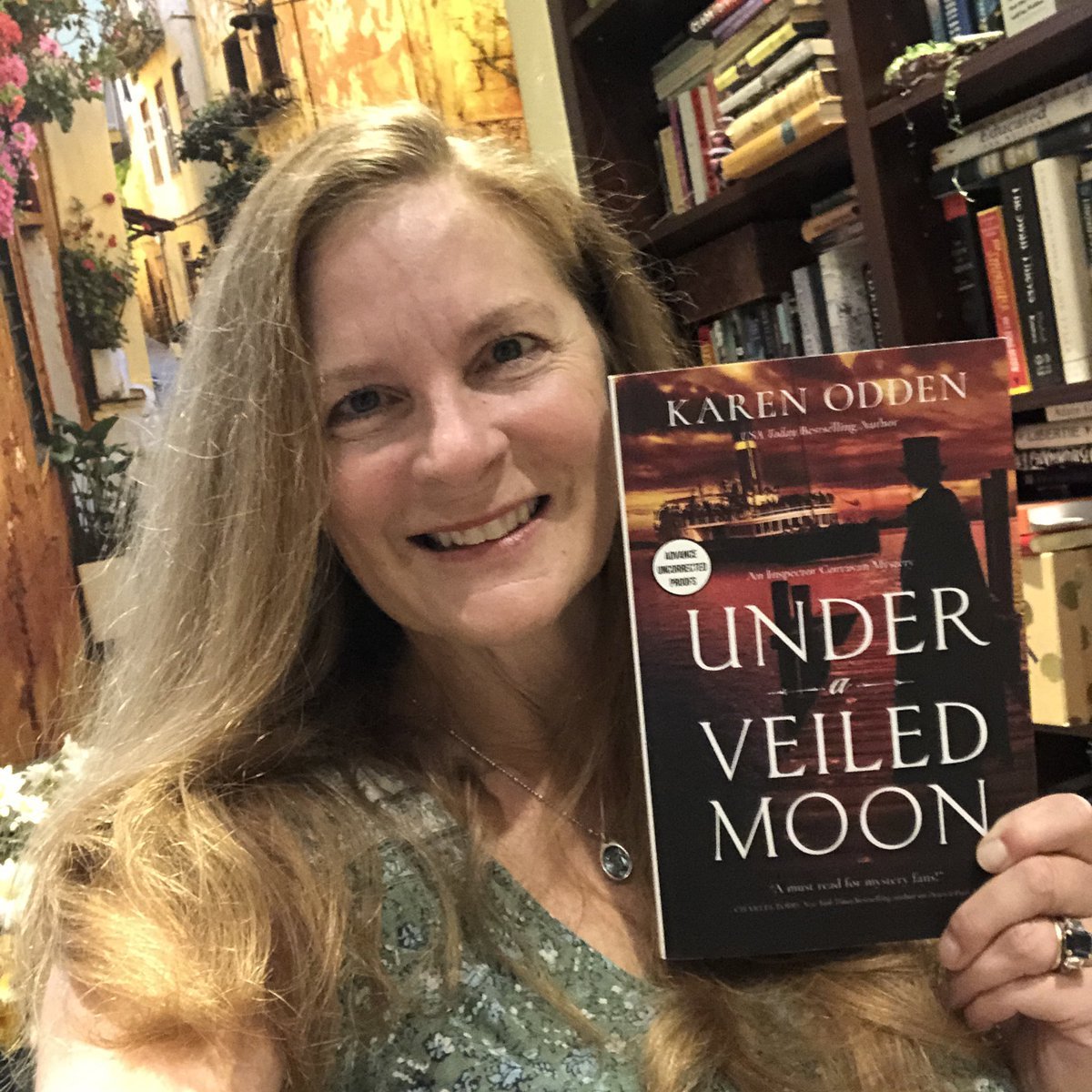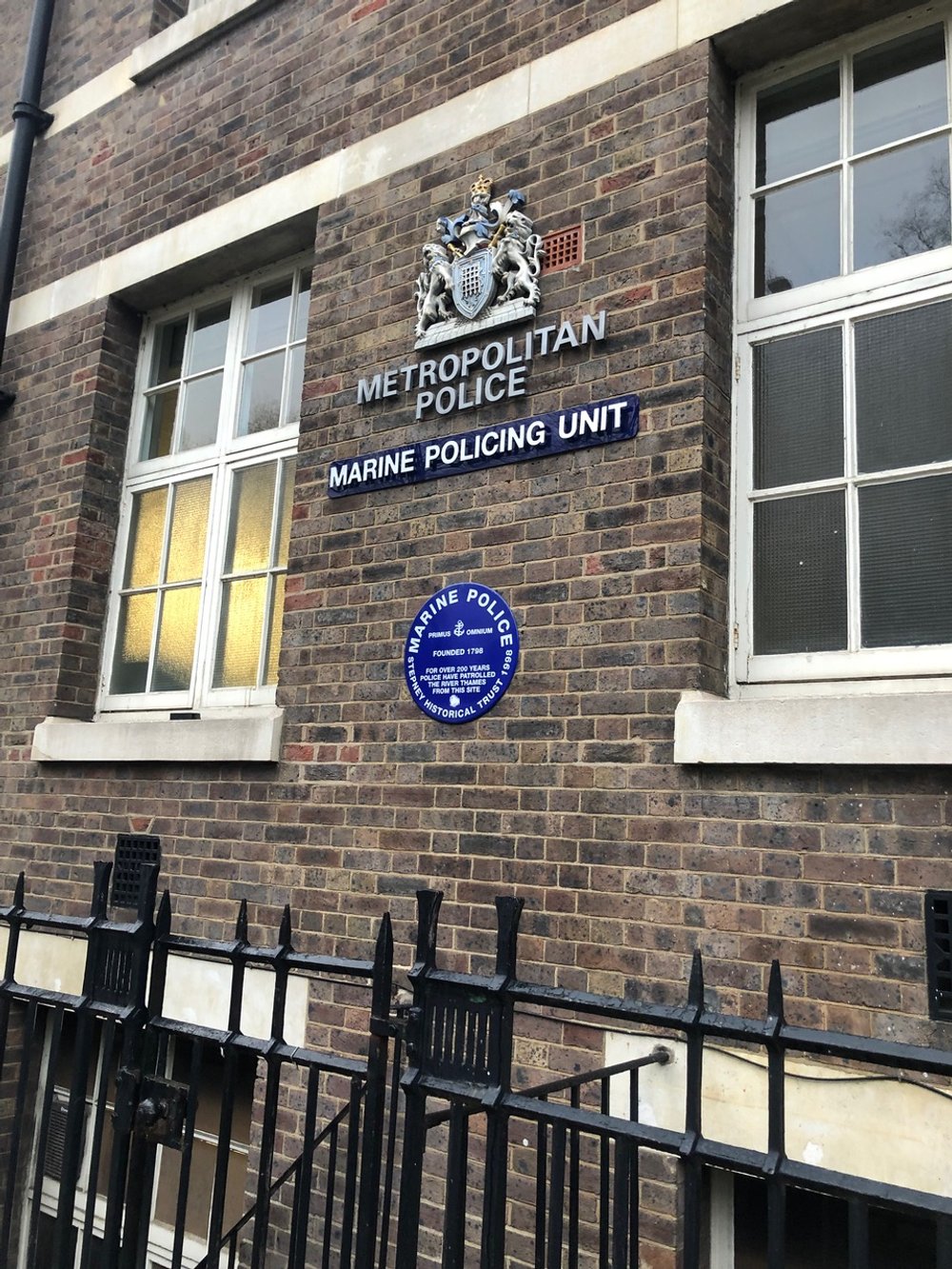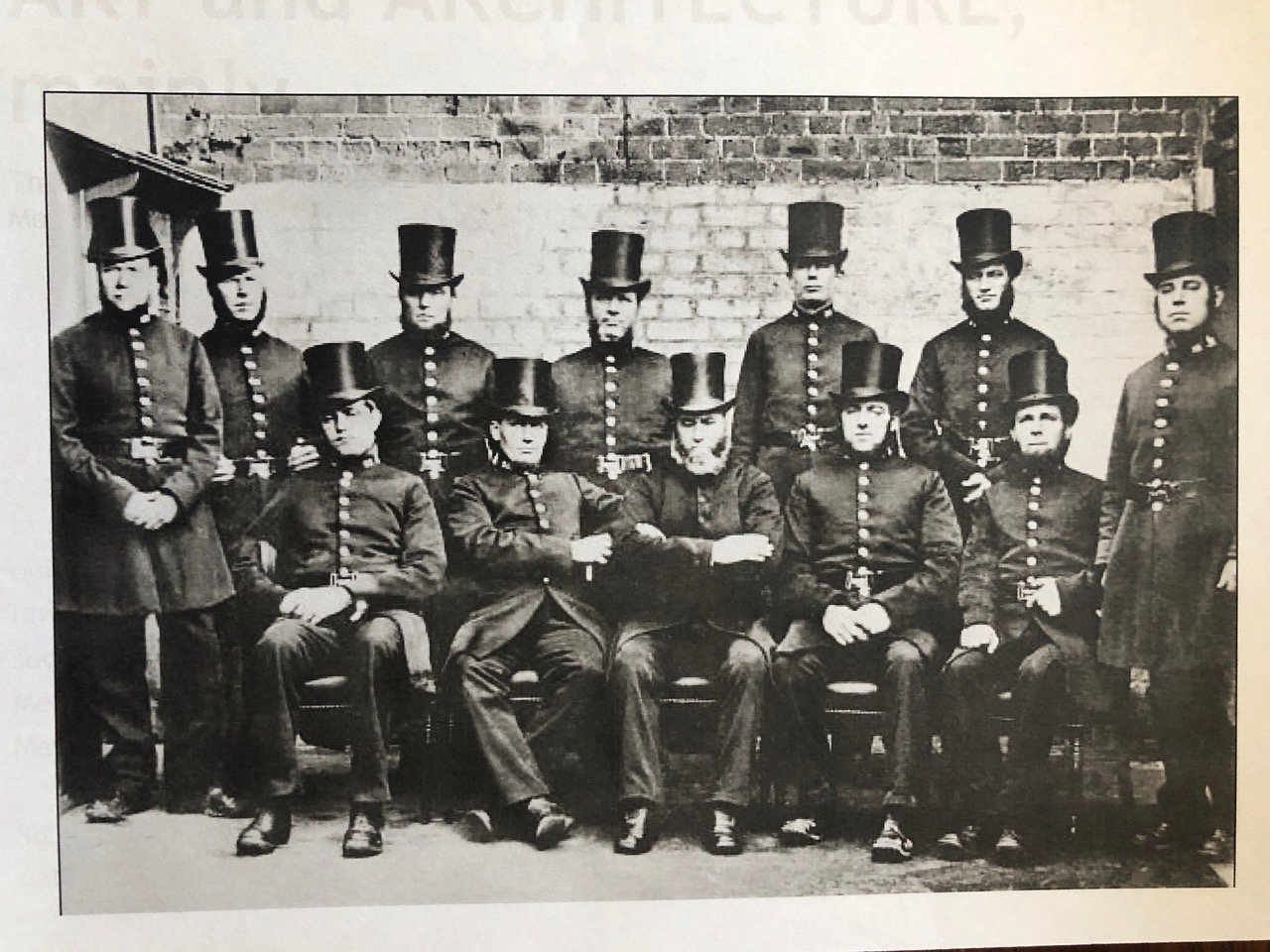Interview with Karen Odden - Author of 'Under A Veiled Moon'
KAREN ODDEN
Interview with Karen Odden
Author of Under a Veiled Moon
🌓
Novel release date: October 11, 2022
My review of Under a Veiled Moon
Publisher: Crooked Lane Books
Visit Karen’s website for information on her novels and to get her newsletter.
⚓️
Karen Odden, USA Today Bestselling Author
Karen received her Ph.D. in English literature from New York University and subsequently taught at the University of Wisconsin-Milwaukee. Her first novel, A Lady in the Smoke, was a USA Today bestseller and A Dangerous Duet and A Trace of Deceit have won awards for historical mystery and historical fiction. Under a Veiled Moon, her fifth mystery and the second book in the Inspector Corravan series, will be released October 11, 2022. Read More…
📚 📚 📚 📚 📚
INTERVIEW
Welcome, Karen!
Please provide the inspiration behind the latest Inspector Corravan mystery novel.
When I was researching for the previous book, Down a Dark River, I came across a mention of the “worst maritime disaster that London had ever seen” – the sinking of the Princess Alice in September 1878. I scribbled a note and tossed it into a folder marked “Corravan #2” because the disaster occurred three months after DADRends, and it was a unique, harrowing event that seemed ripe with possibility for a mystery.
The Princess Alice was one of a small fleet of wooden pleasure steamers that made daily trips along the Thames, from London Bridge out to the sea and back. For two shillings, a passenger could ride all day, disembarking for a picnic or a visit to some famous gardens, and then board the next steamer, rather like the hop-on, hop-off tour buses in many US cities. (Do you have them in Australia?) On the moonlit evening of September 3, 1878, the Princess Alice was steaming along the south shore of the Thames, coming around Tripcock Point, which was a blind curve. A 900-ton collier, the Bywell Castle, coming downstream ran into it, which is comparable to a railway train running into a hansom cab. Within minutes, the steamship sank, and all 650 passengers were thrown into the water. Most drowned – and as no one knew who was on the boat (it being a hop-on-hop-off) London was plunged into chaos and grieving for weeks. True history tells us that it was an accident – the Princess Alice was where she shouldn’t have been, and the Bywell Castle was moving too fast with the ebb tide. But the author in me thought, What if it wasn’t an accident? Who would bring something like this about and why? That became my starting point.
PRINCESS ALICE COLLISION
Do we learn more of the Inspector’s background in book 2? How has the inspector changed or developed from book 1 – 2?
One important change is that Corravan is no longer an inspector at Scotland Yard, at least for the time being. After the events in Down a Dark River, the Yard Director, Mr. Howard Vincent, fired the previous superintendent at Wapping for covering up a murder and installed Corravan as the acting superintendent. So Corravan has a whole new range of responsibilities, including supervising his former colleagues and writing up reports and liaising with his old nemesis Mr. Rotherly, the Wrecks Commissioner.
I like to show changes in Corravan’s character and psychological life as they occur, so he is still the same determined, loyal, street-smart, stubborn man we know and love at the end of Down a Dark River – having learned, in that book, that admitting some vulnerability enables him to empathize with people who feel powerless, which enables him to solve that case.
A significant part of Under a Veiled Moon is concerned with Corravan’s relationship with Colin Doyle, who was a boy when Corravan had to flee Whitechapel as a young man. This book excavates some of Corravan’s experience with the Doyle family during his youth and shows how his leaving affected young Colin. It explores the effects of abandonment, for both Corravan and Colin.
How do the newspapers play an important role in UAVM?
My clever, persistent newspaperman Tom Flynn, of the (fictional) London newspaper the Falcon, appears in all five of my books, and once again Tom and Corravan help each other resolve a complicated puzzle. But one of the advantages of writing historical fiction is that I can take a contemporary issue and put it at a temporal distance in order to make the issue “fresh” to our eyes, to disengage us from our feelings about the issue in the present moment. This book gave me room to examine the material and even mortal dangers of accepting as “normal” the way newspapers “spin” facts, omitting certain details to construct a particular kind of story. There are significant consequences for our social fabric – both then and now.
Please provide at least two interesting facts you learned while doing research for UAVM.
One discovery that surprised me was the viciousness of the prejudice against the Irish during the 1870s. For example, I didn’t realize that someone as powerful as Benjamin Disraeli – Queen Victoria’s favored Prime Minister for decades – wrote a vile letter that was printed under a pseudonym in the Times. Here is an excerpt: “The Irish hate our order, our civilization, our enterprising industry, our pure religion. This wild, reckless, indolent, uncertain, and superstitious race have no sympathy with the English character. Their ideal of human felicity is an alternation of clannish broils and coarse idolatry. Their history describes an unbroken circle of bigotry and blood.” This shocked me and made me look further into anti-Irish feeling.
Another surprise was the fascinating and complex history of the London dockyards. In his history of them, Geoff Marshall writes, “It all started with the Romans” who settled Londinium in AD 50. But the rise of the docks began in the 1700s, when the West India merchants, who moored their ships in the river, lost £500,000 (around $400 million in today’s currency) annually from delays in offloading and from thieves, who were pilfering cargo, often during the night. The only solution seemed to be a closed dock, where ships would be able to offload their goods quickly and be safe from thieves. Part of the problem was the lack of wharf space. The area from London Bridge to Deptford (a few miles east), 879 ships could be safely accommodated; in practice, there were often 1400. As London grew, the huge demand for coal and timber necessitated thousands of deliveries per year. In 1798, the River Police were established, and by 1800 a plan was created to develop the West India Dock and the London Dock at Wapping.
BACK OF WAPPING
Can you tell us a bit about Belinda Gale and her role in Corravan’s life?
Belinda is one of my favorite characters I’ve ever written. A successful novelist and playwright, Belinda Gale is a composite of three Victorian women novelists who supported themselves, and their families, by their pen – Mary Elizabeth Braddon, George Eliot, and Mrs. Henry Wood.
When I give author talks, sometimes I find people have general assumptions about Victorian women that derive from their representation in movies, TV shows, and novels as delicate, powerless, and eager to be married, whether for emotional or financial security. But while real Victorian women did face challenges presented by coverture (the legal doctrine that subsumed a married woman’s identity into that of her husband and made it impossible for her to have her own money) and disenfranchisement (women wouldn’t have the vote until after WWI), some Victorian women did become esteemed doctors, performers, writers, artists, and musicians. Yes, they were outliers, but they were present. In my novels, I like to represent these women, who found what I call “wiggle room” in a world where they were economically, politically, and socially constrained.
Belinda is Corravan’s love interest – but she is independently wealthy and swore to her father on his deathbed that she would thoroughly “vet” a man for several years before making a commitment, so they are not married. She provides the emotional awareness Corravan needs to balance his street smarts and his tendency to barrel ahead single-mindedly; she gives him insight into his own character as well as helping him understand the feelings of others.
Would you say this novel focuses on the Irish more – and if so, in what way?
Yes, it certainly does. As I researched, I discovered an ugly and established prejudice against the Irish was flourishing in London in the 1870s. I also read a book about modern terrorism – and how the Irish Republican Brotherhood (called the “Fenians” in the US) attempted to use bombings to terrorize England into returning Home Rule to Ireland.
For myself, the Irish in this book are a stand-in for any group that is systematically oppressed and disadvantaged by prejudice. I wanted to explore how assumptions and prejudices surrounding the Irish were weaponized by a group bent on destruction, and, more generally, how easy it is for all of us to hold unconscious prejudices, to act upon them unthinkingly, and to leap to conclusions or produce stories that are later shown to be false, but that nonetheless continue to have real consequences.
FRONT OF WAPPING
Harry Lish was introduced in book 1 and although he does not have a huge presence in the second instalment, he does play a useful part. How, so? And, as a character, has he grown in any way from his role in book 1?
Oh, I love Harry! He’s another one of my favorites, and he continues to evolve – from the somewhat sulky boy at the beginning of Down a Dark River to a thoughtful young man with a passion for medicine. For most of this book, Harry is in Edinburgh, observing at a hospital. But he appears in the first chapter and at the end, where he both serves as a foil for Colin Doyle and provides some insight for Corravan. As an eighteen-year-old, Corravan may have failed Colin in some ways; but as a thirty-one-year-old, Corravan has behaved in ways that made Harry feel seen and supported.
What are the main themes or messages in Under a Veiled Moon?
While DADR was about revenge and empathy, this book is concerned more with the complex nature of regret. At one point, one of the characters says, “Regret is a most unfortunate feeling, is it not? … A blackguard may find relief from regret in one of three ways: rotgut, rage, or revenge. But a decent man can do very little with it other than carry it to his grave. I’m afraid that I am going to take this regret to mine, and it is a heavy burden.” Regret is indeed a painful feeling for many of us – but are there ways that it helps us? Is there a way we can frame stories of regret in our own minds, so they can be put to good use as opposed to being merely a painful weight that leads to us feel guilty and ashamed? I wanted to explore that.
Who was the hardest character to write in Under a Veiled Moon?
Hands down, it was Colin Doyle. He’s so frustrating – he makes bad choices … and then he makes worse ones! And he stubbornly refuses to let Corravan help him. However, we do eventually see where this tendency comes from, and this helps the reader to understand why Corravan loves Colin so much. Really, Colin just wants to feel that he’s important, that he matters, that he counts. That’s a pretty universal desire.
Do you have a favourite spot to write in – and/or a favourite place to escape to when you need some inspiration or a breakthrough?
I mostly write in my home office, although right now it’s a little hard because I recently lost my beagle, Rosy, who always kept me company. The empty chair where she used to sleep feels very empty. But my office is just what I need – my books, my 1870s London map on the wall, and my board with illustrations and images from Victorian England to keep me grounded in the period.
To escape, I hike the desert with its gorgeous saguaros (pronounced sa-WORE-oh). I’m lucky to have two great trailheads with multiple hikes within fifteen minutes from my house.
Have you taken any interesting research trips overseas and how has it helped in your writing?
One of my earliest trips to London was as a grad student at NYU in 1999, when I spent 6 weeks researching Victorian railway disasters in the British Library on Euston Road; that work grounded me in the era. Later, I spent a week in London researching the Royal Academy of Music and visiting the one Victorian music hall that remains – Wilton’s in Graces Alley, Whitechapel. As I stood across from its stage, Nell Hallam’s story took hold of me. I’m a firm believer in getting your feet on the ground, where your characters walked, if you can!
More recently, my college-age daughter spent a semester over in England last year, and I met her at the end of it. She’s a kindred spirit (as Anne Shirley would say), and we had twelve delightful days in London together for museums and tea and bookstores and walks. One of the most productive days I had researching was at the Museum of London Docklands (https://www.museumoflondon.org.uk/museum-london-docklands). Located in a repurposed Victorian warehouse, with the original floors and fire doors, it held everything that Michael Corravan used as a stevedore and lighterman – swan-necked carts, scales, a lighterman license, a lighter boat, and so on. There were maps and oral histories, which was just what I wanted to flesh out Corravan’s backstory. I used a great deal of the information about warehouses for Under a Veiled Moon as well.
An early photo of uniformed constables. Note the top hats — they were reinforced with cane, so they could serve as step stools. And the brims were reinforced, so they could break someone’s nose.




